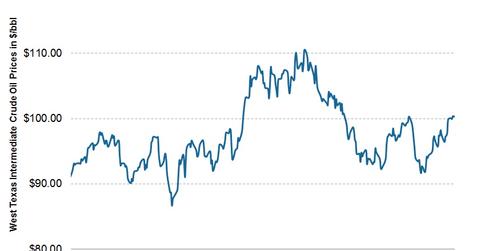WTI crude prices break $100 per barrel for the 1st time in 2014
WTI traded flat last week, but firstly traded up $100 per barrel since December 27. This past week’s upward movement in prices was a short-term positive for the sector.
Feb. 19 2014, Published 8:00 a.m. ET

Oil prices are a major valuation driver for energy stocks
West Texas Intermediate (or WTI) crude oil (priced at Cushing, Oklahoma) is the benchmark crude for U.S. oil. So movements in WTI oil prices are a major driver in the valuation of domestic oil producers. Higher oil prices also incentivize producers to spend more money on drilling, which results in increased revenues for oilfield service companies (companies that provide services such as drilling, fracking, and well servicing). Consequently, WTI prices are an important indicator to watch for investors who own domestic energy stocks.
WTI crude prices broke $100 per barrel for the first time since December
Last week, WTI crude oil prices finished at $100.30 per barrel, compared to $99.88 per barrel the week prior. Though WTI traded relatively flat last week, it has been up 5% since January and broke $100 per barrel for the first time since December 27. Last week, reported inventories data showed a larger-than-expected build in crude inventories, which is generally a negative signal to crude prices. However, the reported stocks at Cushing, a major oil hub in Oklahoma, continued to fall by 2.7 million barrels last week, which was the largest weekly decline since July, driving the total stocks there to 37.6 million barrels. The market weighed this as a positive catalyst for WTI prices as the WTI oil benchmark price is determined at Cushing. For more on the latest inventories report, please see How could inventories data affects the market.
Note that WTI more represents the price producers receive in the U.S., and there’s another benchmark for crude called Brent, which more represents the price producers receive internationally. As the domestic benchmark, WTI prices matter more for domestic companies such as Chesapeake Energy (CHK), Range Resources (RRC), EOG Resources (EOG), and Pioneer Natural Resources (PXD) than for companies with significant international exposure, where Brent prices might be more relevant to watch.
Oil prices have remained relatively high and stable, supporting energy company valuations
For most of this past year, WTI crude oil has been range-bound between ~$85 per barrel and ~$110 per barrel. As we’ve seen, higher crude prices generally have a positive effect on stocks in the energy sector. The below graph shows WTI crude oil price movements compared to XLE and EOG on a percentage change basis from January 2007 onward. You can see that crude oil, the XLE ETF, and EOG (one of the largest U.S.-concentrated companies in the energy space) have largely moved in the same direction over the past several years.
As the graph above shows, crude oil prices are a major driver in the valuation of many energy investments. Oil prices affect the revenues of oil producers and consequently the amount of money oil producers are incentivized to spend on oilfield services.
This past week’s upward movement in prices was a short-term positive for the sector. The longer-term stable and elevated oil price has been positive, as crude prices have largely remained above $80 per barrel since late 2010. Investors with domestic energy holdings in names such as CHK, EOG, RRC, or PXD may find it prudent to track the movements of benchmarks such as WTI crude.
